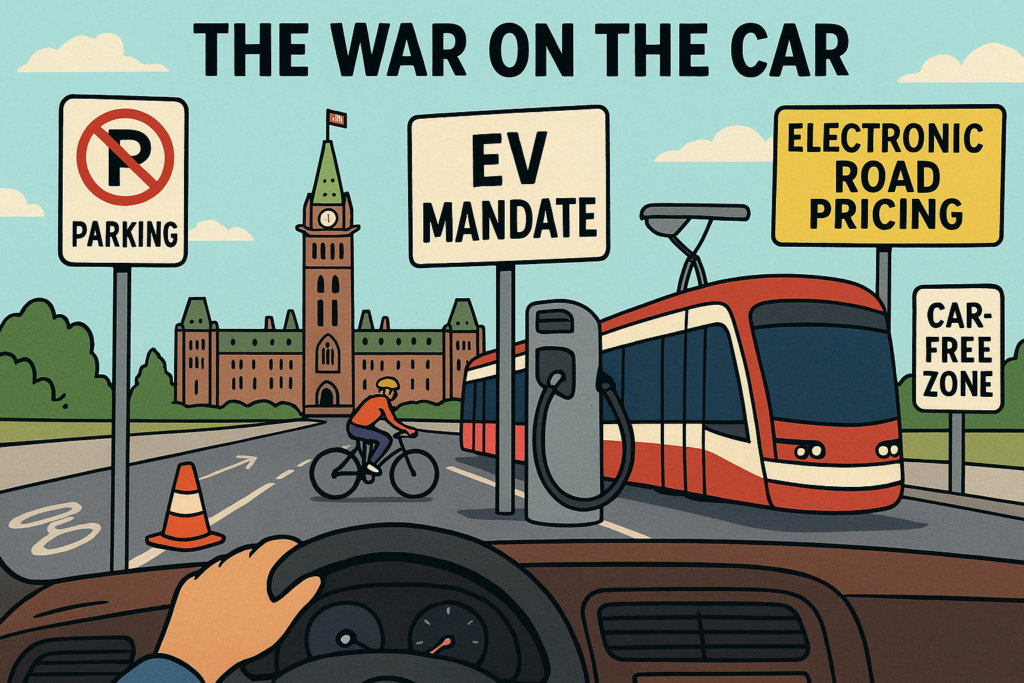Remember the “war on the car”?
For decades, municipalities around the world have been waging a relentless war on cars and their drivers. The left, including but not limited to the green left, claims this war is in defense of the environment. But they also seem to dislike the many benefits of automobiles – comfort, convenience, personal safety, economic growth, freedom, support for families, individual flourishing, and so on.
But how have they been conducting this war on the car (WOTC)?
London is famous for its £15 per day congestion pricing and Ultra Low Emission Zones (ULEZ). Numerous other large cities have experimented with various parking restrictions, including “car-free zones,” “no-drive days,” Electronic Road Pricing, and Low-Traffic Neighbourhoods. And then there is the Orwellian “15-minute city,” perhaps the ultimate municipal WOTC move.
Here in Canada, and elsewhere, an especially punitive tactic of the WOTC has been led by municipalities building Light Rail Transit (LRTs). The urban and suburban left have been pushing these above-ground electric trains, which invariably make for more traffic congestion on key thoroughfares. Ask drivers in Vancouver, Edmonton, Calgary, Mississauga, Brampton, Toronto, and Ottawa about these over-priced and under-used congestion-creating monsters. Drivers who succumb and attempt to use transit instead of their cars are often rewarded by crowding, delays and breakdowns. Ottawa’s LRT has been notorious for its unreliability, especially in winter.
And let’s not forget the municipally mandated and now ubiquitous bike lanes. In Toronto, the issue ended up in court after the Ontario government attempted to remove bike lanes from just two heavily clogged arteries. Recently, an Ontario Superior Court of Justice determined that the government’s plan to remove the bike lanes was, incredibly, unconstitutional. The Ontario government promptly appealed this decision, so we await the final word as to whether this will ultimately be a victory for the anti-car movement and its zealotry to make it tougher to drive in Toronto.
The Toronto Star recently devoted an entire column to talking drivers out of their cars, encouraging folks to join the “car-free movement” (is that a thing?) and adopt a more enlightened “mindset” to car ownership. I gather this involves a lot of walking, cycling, ridesharing and even a passing suggestion to offset costs by taking on deliveries. (Is the Star recruiting for Amazon now?)
The condescending tone doesn’t stop there. If you cannot adopt a “car-free mindset,” the Star offers this handy advice for drivers: remove shoes from your trunk and back seat to reduce drag, and shop around for better car insurance rates. (The Star seems unaware of the common practice of keeping a bag of salt or kitty litter in the back to improve winter traction.) Has the “personal finance reporter” who authored this article ever met any average Canadians? Intelligent people who manage their finances responsibly and make informed decisions every day on how to save and spend their own money?
There’s no doubt that a car-free lifestyle is possible and perhaps not too painful if one resides in a dense, urban setting, works from home, and lives a simple lifestyle. Many Torontonians, and perhaps even Calgarians and Vancouverites who reside in the city centre, can use public transit, Uber, walk to get where they need to go, and rent a car for longer trips outside the city. Cars aren’t a luxury for millions of Canadians, however. They are the foundation of livelihoods and lifelines for maintaining a decent quality of life, enabling individuals to keep their jobs, support their families, care for loved ones, and participate fully in their communities.
Recently, the Toronto Sun reported on something called Build Toronto, ostensibly a group of local residents who “spotlight bold ideas” such as charging a toll of $10 to $15 each time a car enters the city. “A sin tax on human mobility” is what 2023 Toronto mayoralty candidate Anthony Furey calls it.
Author Joe Warmington correctly labels it “a congestion tax to fund green ideology,” which will hurt those with lower incomes much more than the ones who can afford Teslas, live in the city, and only enter it when they’re returning home from a weekend at their cottage in Muskoka.
Speaking of Teslas, my next column will argue that the electric vehicle “craze” – if you can call it that – embodies a malicious and powerful escalation of the WOTC. Stay tuned.

